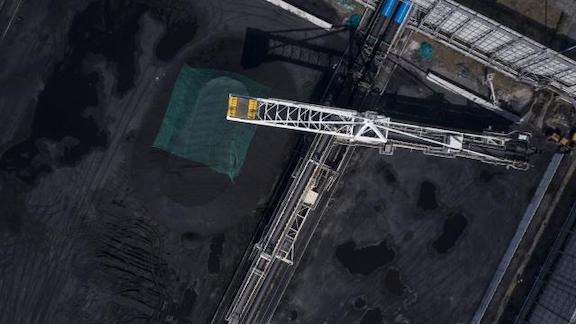China’s commodities imports bounced back in 2023, including record hauls of crude oil, coal, copper ore and iron ore, after the pandemic ravaged demand in the previous year.
Among the biggest increases, oil and natural gas imports recorded growth of 10% or more, while coal surged over 60%, according to the customs administration on Friday, defying stutters in the wider economy that have revolved around the implosion of China’s property market.
Still, raw materials demand hasn’t quite lived up to the heady expectations set at the start of 2023, when forecasts were plentiful that China’s economy would roar back after three years of crippling Covid restrictions. Instead, markets relied on a drip-feed of stimulus measures from the government to sustain growth.
China’s exports fell last year for the first time since 2016 as global demand weakened, undercutting a strong growth driver for the economy.
And the domestic outlook remains fraught. Housing market gloom, deflation, and excessive local government debt, as well as simmering geopolitical tensions, all pose headwinds to consumption for the world’s biggest commodities buyer in the year ahead.

Energy Products
Crude oil was a bright spot for demand in 2023. Freed from Covid Zero, China’s citizenry resumed domestic travel with a vengeance. But imports peaked over the summer and growth is likely to cool still further this year as that pent-up appetite fades and a sluggish economy weighs on consumption.
Coal imports exploded higher last year as Beijing supplemented its record domestic production to ensure that seasonal peaks in demand were covered and blackouts avoided. December’s 47 million tons was an all-time high for a single month. But purchases could moderate from here given ample supply and the expansion in clean energy. The restoration of import taxes could also dull the appetite for overseas purchases.
Natural gas imports rebounded in 2023 as more gas flowed overland from Russia, and China regained its standing as the world’s top importer of seaborne fuel. Like coal, the near-13 million tons purchased in December was a monthly record. Consumption is set to expand for years to come given gas’s relatively small share of China’s energy mix and the growing appetite for cleaner fuels.
Metals Markets
Copper metal imports fell as China’s smelting expansion sucked in record quantities of ore and more copper was processed domestically. Although burgeoning green demand helped offset some of the impact of the property crisis and a slowing economy, that driver is facing challenges. China’s breakneck growth in renewable power is running up against grid constraints and electric vehicle sales are slowing. Global ore supplies, meanwhile, are tightening.
Iron ore purchases rose as China’s steel industry found other avenues of demand to counter the cratering property market, including shipbuilding, machinery and green infrastructure at home, as well as exports, which ballooned to a seven-year high. For the year ahead, much depends on the amount of fiscal stimulus the government deploys to support the economy, and whether Beijing reinstates production curbs on steel to reduce emissions.
Agricultural Goods
Soybean imports handily beat the previous year’s tally but fell short of 2020’s record, when shipments topped 100 million tons. That could prove a high-water mark for the trade as Beijing strives to cut its reliance on foreign suppliers by reducing soy’s share in livestock rations.
Edible oil shipments rebounded strongly last year after lockdowns poleaxed consumption in 2022. But meat imports showed a slight decrease due to weakness in the domestic pork market — a key deflationary signal — which discouraged overseas purchases.

Follow us on social media: